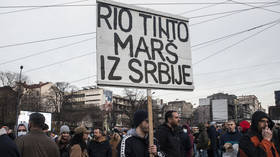Serbian president accuses Western NGOs of attempt to topple govt

Serbian President Aleksandar Vucic has brushed aside denials by Western governments that it was they who had funded the environmental protests that forced Belgrade to scrap an ambitious mining project.
He doubled down on the accusations made by his prime minister, saying that those who had provided the funds for the demonstrations through various NGOs had sought to damage his administration.
“Those foreign foundations are helping to topple the government in Serbia,” he said in an interview with local media. “These protests have nothing to do with the environment.”
Vucic was referring to the plans of the Anglo-Australian minerals conglomerate Rio Tinto to build a lithium mine near the city of Loznica, in western Serbia.
Environmental organizations had staged a series of mass protests against the mine since November, closing major highways and otherwise putting pressure on the government. Last week, they secured a victory, when Prime Minister Ana Brnabic announced that the project would be scrapped.
As she announced the change of plans on Thursday, Brnabic denounced the organizers of the protest. She accused them of acquiring money for their activities from foreign funders, whom she called hypocrites.
Most of the funding, she claimed, had come from the US, Great Britain, Germany, and Austria through nonprofit organizations such as the Rockefeller Foundation, USAID, the Westminster Foundation for Democracy, the British Council and the Heinrich Böll Foundation.
The US, the UK, and Germany rejected the allegations, saying that Brnabic’s claims were “damaging” and did not “reflect our partnership with Serbia.” The three nations said in a joint statement on Friday that they had been “among its most generous and reliable partners and friends, providing assistance funding totaling well over €3 billion [$3.4 billion].” They denied having had a hand in “funding or directing actions specifically targeting the Serbian government or any of its policies,” including through the provision of funds for protests.
In an interview on Saturday, Vucic said the prime minister had fought for the wellbeing of the Serbian people by supporting the lithium mine project, but could not overcome the resistance from those who had sought to put a stop to the project by whipping up public opposition. In the end, the government had had to yield to the demands of the people, he said.
Had the project been implemented, the Jadar mine would have been one of the largest of its kind in the world. Rio Tinto had pledged €2.4 billion ($2.7 billion) in investment and promised to use local labor for construction and create around 1,000 permanent jobs that would predominantly go to local workers.
The multinational had expected production to start in 2027, turning Serbia into a major supplier of raw materials for manufacturing lithium-ion batteries – the core element in the global transition to electric vehicles and renewable energy.













